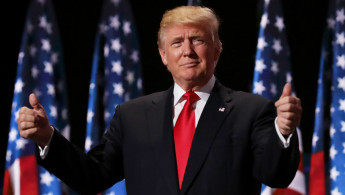Trump could allow Riyadh to 'enrich uranium' with new US-Saudi nuclear deal
A US nuclear company might Russian and Chinese sidestep rivals looking to build reactors in Saudi Arabia, by offering uranium refinement if Donald Trump relaxes current restrictions.
2 min read
Trump is reportedly considering easing US nuclear restrictions [Getty]
Saudi Arabia might be allowed to enrich uranium, if it accepts a bid to build new nuclear reactors in the kingdom from a US company.
President Donald Trump could relax current restrictions on US companies building nuclear plants in Saudi Arabia by allowing them to offer uranium enrichment and reprocessing.
With billions of dollars at stake and a pledge by Trump to kick-start America's nuclear industry, sources told Bloomberg that rules governing the export of uranium refinement technology to Saudi Arabia could be loosened.
Nuclear giant Westinghouse is looking to put behind recent business hiccups in the US by winning contracts in Saudi Arabia.
The kingdom is looking to build 16 nuclear reactors over the next 20 to 25 years, at a cost of up to $80 billion, the business magazine reported.
With tough competition from Russian and Chinese companies, Westinghouse would benefit from the sweetener of providing uranium enrichment and processing in the deal.
Energy Secretary Rick Perry has already been to Saudi Arabia looking into the deal, the sources said.
Trump is now reportedly prepared to help the nuclear giant win the contracts by considering scrapping an Obama-era prohibition on US technology being used for uranium refinement and reprocessing in Saudi Arabia.
The decision would do little to quell tensions in the region between Iran and Saudi Arabia, which is partly centered on Tehran's own nuclear programme.
Both countries have been accused of having nuclear ambitions, but a recent agreement between Iran and world powers will likely see Tehran's programme monitored and curtailed.
Trump has threatened to tear up the pact - struck under his predecessor Barack Obama - which the president has called "the worst deal ever negotiated".
President Donald Trump could relax current restrictions on US companies building nuclear plants in Saudi Arabia by allowing them to offer uranium enrichment and reprocessing.
With billions of dollars at stake and a pledge by Trump to kick-start America's nuclear industry, sources told Bloomberg that rules governing the export of uranium refinement technology to Saudi Arabia could be loosened.
Nuclear giant Westinghouse is looking to put behind recent business hiccups in the US by winning contracts in Saudi Arabia.
The kingdom is looking to build 16 nuclear reactors over the next 20 to 25 years, at a cost of up to $80 billion, the business magazine reported.
With tough competition from Russian and Chinese companies, Westinghouse would benefit from the sweetener of providing uranium enrichment and processing in the deal.
Energy Secretary Rick Perry has already been to Saudi Arabia looking into the deal, the sources said.
Trump is now reportedly prepared to help the nuclear giant win the contracts by considering scrapping an Obama-era prohibition on US technology being used for uranium refinement and reprocessing in Saudi Arabia.
The decision would do little to quell tensions in the region between Iran and Saudi Arabia, which is partly centered on Tehran's own nuclear programme.
Both countries have been accused of having nuclear ambitions, but a recent agreement between Iran and world powers will likely see Tehran's programme monitored and curtailed.
Trump has threatened to tear up the pact - struck under his predecessor Barack Obama - which the president has called "the worst deal ever negotiated".
Saudi Arabia and other Gulf states are also sceptical about the deal and Riyadh has vowed to match Iran's nuclear capabilities, particularly if Tehran develops a nuke.





 Follow the Middle East's top stories in English at The New Arab on Google News
Follow the Middle East's top stories in English at The New Arab on Google News
![The UAE is widely suspected of arming the RSF militia [Getty]](/sites/default/files/styles/image_330x185/public/2024-11/GettyImages-472529908.jpg?h=69f2b9d0&itok=Yauw3YTG)
![Netanyahu furiously denounced the ICC [Getty]](/sites/default/files/styles/image_330x185/public/2024-11/GettyImages-2169352575.jpg?h=199d8c1f&itok=-vRiruf5)
![Both Hamas and the Palestinian Authority welcomed the ICC arrest warrants [Getty]](/sites/default/files/styles/image_330x185/public/2024-11/GettyImages-2178351173.jpg?h=199d8c1f&itok=TV858iVg)